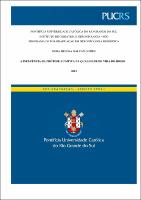| Share record |


|
Please use this identifier to cite or link to this item:
https://tede2.pucrs.br/tede2/handle/tede/8234| Document type: | Dissertação |
| Title: | A influência da prótese auditiva na qualidade de vida do idoso |
| Author: | Gomes, Nora Helena Galvan  |
| Advisor: | Terra, Newton Luiz |
| Abstract (native): | A deficiência auditiva no idoso é uma das incapacidades com maior impacto na sua vida diária, dificultando sua comunicação com o ambiente. Além disso, ocorre uma grande dificuldade na aceitação dessa incapacidade por parte da família e pelo próprio idoso, o que demanda uma grande necessidade em conscientizá-los sobre a dificuldade presente e o quanto lhe é prejudicial. Nessa faixa etária, existe uma tendência natural ao isolamento, voluntário, sendo esses idosos privados do convívio social pleno, podendo levá-los a níveis variados de depressão. Este estudo teve como objetivo avaliar a influência da prótese auditiva na qualidade de vida e na audição em idosos com deficiência auditiva. Para isso, participaram do estudo 50 idosos, sendo 29 do sexo feminino e 21 do sexo masculino, com idade igual ou superior a 60 anos. Após completarem a bateria de testes audiológicos, foram divididos em dois grupos: G1 – Grupo de Intervenção –, que fez uso de prótese auditiva, e G2 – Grupo Controle –, que não fez uso de prótese auditiva. Em todos foram aplicados os testes Hearing Handicap Inventory for the Elderly – Screening Version (HHIE-S), MiniExame do Estado Mental (MEEM) e World Health Organization Quality of Life Bref (WHOQOL-Bref), antes do uso das próteses auditivas e 12 semanas após. Foi realizado acompanhamento semanal para garantir a adaptação e o uso efetivo das próteses adaptadas. No G1, a análise do HHIE demonstrou que os escores da Escala Emocional e Escala Social/Situacional no período após o uso das próteses auditivas se mostrou estatisticamente significante quando comparada com a análise do G2, que se manteve inalterado. Os resultados do MEEM, no período pós-intervenção, não apresentaram diferenças estatisticamente significantes, comparando os dois grupos. No teste WHOQOL-Bref, ocorreram mudanças apenas em um domínio. Com esses resultados, infere-se que o uso da prótese auditiva proporciona ao idoso uma menor autopercepção de restrições de participação, observada pelo uso do questionário de autopercepção HHIE-S. A qualidade de vida modifica, como foi demonstrado pelo WHOQOL, no domínio físico, comparando com idosos que não fizeram uso de amplificação auditiva. Foram observadas também mudanças nos escores do teste MEEM, comparando com o grupo sem amplificação. |
| Abstract (english): | Hearing loss in the elderly is a disability that causes the greatest impact on your daily life, making it difficult to communicate with the environment. Occurs as a result, a great difficulty accepting this inability on the part of the family, and the very elderly, there is a need to make them aware of this difficulty, and how it is harmful. In this age group there is a natural tendency to isolation, volunteer, and these elderly deprive of full social life, and as a result, may lead to varying levels of depression. This study aimed to evaluate the influence of hearing aids on quality of life and hearing in older adults with hearing impairment. The study included 50 older adults. Being 29 females and 21males, aged over 60 years. After completing the battery of audiological tests were divided into two groups: G1 – Intervention Group, with made use of hearing aids, and G2 – Control Group, who did not use hearing aids. In all test was applied HHIE-s, MMSE, and WHOQOL-Bref before the use of hearing aids and 12 weeks after. We conducted weekly monitoring to ensure effective adaptation and use of prostheses adapted. In G1, the analysis of the HHIE is showed that the scores Scale Emotional and Scale Social/Situational post in the of hearing aids, showed statistically significant compared to the G2, which remained unchanged. The results of the MMSE in the post intervention period showed no statistically significant differences comparing the two groups. In the test WHOQOL-Bref the same fact occurred because the changes were not statistically significant. The use of hearing aids for the elderly provides a lower perception of participation constraints observed through the use of self-perception questionnaire HHIE-S. The quality of life improves, demonstrated by WHOQOL in the physical domain, compared with seniors who do not use hearing amplification. There was also an improvement in the MMSE test scores, compared with the group without amplification. |
| Keywords: | Envelhecimento Idoso Perda Auditiva Qualidade de Vida Prótese Auditiva Cognição |
| CNPQ Knowledge Areas: | CIENCIAS DA SAUDE::MEDICINA |
| Language: | por |
| Country: | Brasil |
| Publisher: | Pontifícia Universidade Católica do Rio Grande do Sul |
| Institution Acronym: | PUCRS |
| Department: | Escola de Medicina |
| Program: | Programa de Pós-Graduação em Gerontologia Biomédica |
| Access type: | Acesso Aberto |
| Fulltext access restriction: | Trabalho não apresenta restrição para publicação |
| URI: | http://tede2.pucrs.br/tede2/handle/tede/8234 |
| Issue Date: | 26-Mar-2013 |
| Appears in Collections: | Programa de Pós-Graduação em Gerontologia Biomédica |
Files in This Item:
| File | Description | Size | Format | |
|---|---|---|---|---|
| GOMES_NORA_HELENA_GALVAN_DIS.pdf | GOMES_NORA_HELENA_GALVAN_DIS | 4.67 MB | Adobe PDF |  Download/Open Preview |
Items in DSpace are protected by copyright, with all rights reserved, unless otherwise indicated.




